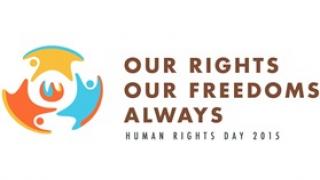
This Human Rights Day, UNA-UK members and supporters are calling on their MPs to show their support for human rights by participating in an upcoming House of Commons debate on the issue.
Celebrated annually on 10 December, the occasion marks the anniversary of the adoption of the Universal Declaration of Human Rights. This year, a backbench debate on International Human Rights Day has been secured in the main chamber of the House of Commons. This timely debate should be a priority for all those concerned by the recent discourse on human rights in the UK.
Safeguarding human rights at home
The debate around human rights in the UK has become something of a fault line in British politics in recent years. At the 2015 general election, the majority of political parties rallied around the UK's Human Rights Act. This vital piece of legislation incorporates the European Convention on Human Rights into domestic law, and provides legal protection for 17 of the Universal Declaration's essential civil and political rights.
The UK's human rights arrangements are, however, vulnerable. A Government pledge to repeal the Act and replace it with a Bill of Rights is understood to be in motion at the Ministry of Justice, although a planned consultation exercise and draft Bill have yet to be published. Whilst our rights hang in the balance, it is imperative that our representatives are both engaged and well-informed on this debate.
In light of this, UNA-UK has published a new briefing, Human rights in the UK: from international obligations to everyday protections. It explains the origins of human rights in this country, assesses what the strengths and weaknesses are of the current system and summarises what the international ramifications are for the UK's standing on the world stage.
We are asking our members and supporters to share this briefing with their MPs and to urge them to participate in the House of Commons debate on Thursday 10 December.
Protecting human rights internationally
As well as ensuring the highest possible standards of human rights at home, it is imperative the Government also maintains a strong commitment to defending human rights in those countries where it is still a highly dangerous principle to employ.
UNA-UK was concerned, therefore, when in October, the Foreign & Commonwealth Office's (FCO) most senior official informed Parliament that human rights were "not one of our top priorities". This came shortly after the FCO revised its human rights objectives, dropping its list of thematic priorities and re-naming its flagship watch list of "human rights countries of concern" to the more neutral sounding "human rights priority countries".
This position seems especially incongruous when considered against the range and depth of human rights crises the FCO is tasked with addressing. From impending emergencies in Syria and Burundi to long-term disputes in Myanmar and Palestine, human rights abuses can be both the cause and symptoms of wider conflict.
In a bid to strengthen the hand of those working to promote human rights in dangerous regions around the world, a UN resolution on the important role of human rights defenders (HRDs) was recently debated in New York. According to a new report from the UN Secretary-General, HRDs face increasing acts of violence and intimidation, often committed with impunity. Yet a number of states attempted to weaken the text - including a record 39 hostile amendments from the African Group.
UNA-UK and more than 150 other NGOs signed a joint letter urging states to drop the amendments and pass the resolution, which was subsequently adopted, though with a disappointing 14 states voting against the motion and 40 abstentions.




